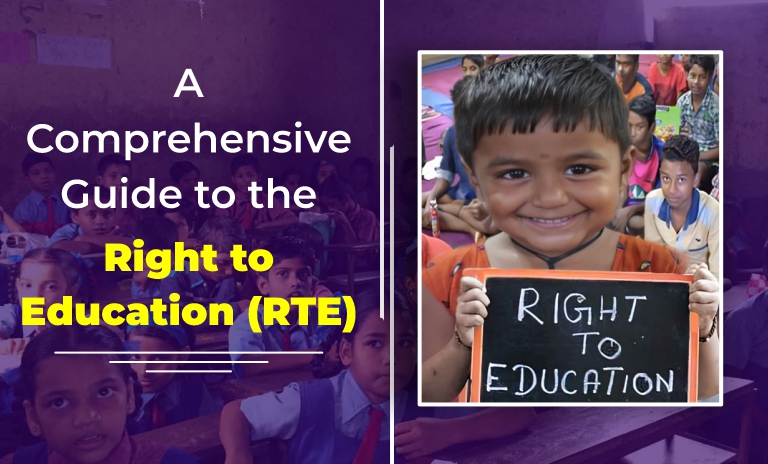
Unlocking Education for All: A Comprehensive Guide to the Right to Education (RTE)
Understanding the Right to Education (RTE): The Right to Education (RTE) ensures that every child has access to free and compulsory education. Established under the RTE Act of 2009, it mandates quality education for children aged 6 to 14 years. This landmark legislation aims to bridge the educational gap and foster inclusive learning environments across India.
Also Read: Top MBA Colleges in India, Top Universities in India, and Top Engineering Colleges in India
The Right to Education Act: A Milestone in Indian Education
The Right to Education Act of 2009 transformed India’s educational landscape by making education a fundamental right. The Act emphasizes quality education, prohibits discrimination, and ensures infrastructure standards in schools, thereby promoting equitable learning opportunities.
Decoding RTE: Full Form and Significance
RTE stands for the Right to Education. This constitutional right empowers children to receive free and compulsory education, ensuring that socio-economic barriers do not hinder their learning journey.
Navigating the RTE Portal for Seamless Access
The RTE Portal serves as a one-stop platform for parents and guardians to access admission details, application forms, and important updates related to RTE admissions, simplifying the entire process.
Simplifying RTE Admission Process
RTE admissions allow underprivileged children to secure free education in private schools. The streamlined application process, available through state-specific portals, ensures wider participation and transparency.
RTE Rajasthan: Bridging Educational Gaps
Rajasthan’s RTE implementation focuses on enhancing educational access for marginalized communities. The state’s dedicated RTE portal simplifies the admission process, ensuring more children benefit from quality education.
RTE in Madhya Pradesh: Inclusive Learning for All
Madhya Pradesh actively promotes inclusive education through its RTE Portal. The state facilitates hassle-free admissions and timely updates for parents seeking quality education for their children.
RTE Uttar Pradesh: Expanding Educational Access
Uttar Pradesh’s RTE initiatives ensure widespread educational opportunities for underprivileged children. The state portal simplifies applications, ensuring transparency and accessibility.
The RTE Act 2009: Paving the Way for Free Education
The RTE Act 2009 mandates free and compulsory education, aiming to eradicate illiteracy and promote equitable learning environments across India.
Embracing Digital Education with RTE Online
RTE online platforms streamline the admission process, enabling parents to apply for their children’s education without physical visits. This digital shift promotes greater accessibility and convenience.
RTE Portal MP: Simplifying Access in Madhya Pradesh
Madhya Pradesh’s dedicated RTE Portal provides comprehensive information on admissions, ensuring parents can easily apply and track applications for their child’s education.
RTE 25 Admission in Maharashtra: A Step Towards Inclusivity
The RTE 25 Admission Maharashtra initiative reserves 25% of seats in private schools for economically weaker sections. This scheme promotes equal educational opportunities for all.
RTE Delhi: Advancing Education in the Capital
Delhi’s RTE initiatives aim to bridge the educational gap by ensuring free education for underprivileged children. The RTE Delhi portal simplifies the admission process.
RTE Bihar: Empowering Students through Education
Bihar’s RTE implementation focuses on making quality education accessible to marginalized communities. The state’s portal streamlines admissions and fosters inclusive learning.
Exploring the RTE Delhi Official Website
The official RTE Delhi website offers parents all necessary details about the admission process, guidelines, and application deadlines, enhancing the transparency of the system.
RTE Login: Easy Access to Admission Services
The RTE login feature allows parents to track applications, receive updates, and manage admissions seamlessly, fostering a user-friendly experience.
RTE Portal Login: Gateway to Education Services
RTE Portal Login ensures secure access to application forms, admission status, and important updates, streamlining the user experience.
RTE Application: Bridging the Gap
Filling out the RTE application form is the first step toward securing free and quality education for children from disadvantaged backgrounds. Online forms simplify this process.
RTE Online Form: Convenience at Your Fingertips
The RTE online form allows parents to apply for school admissions from the comfort of their homes, promoting accessibility and ease of use.
RTE Uttarakhand: Ensuring Educational Equity
RTE Uttarakhand works towards providing inclusive and equitable education for every child. The state’s portal streamlines the admission process for ease of access.
RTE Admission 2024-25 Maharashtra: A New Academic Journey
RTE Admission 2024-25 in Maharashtra focuses on providing equitable education by reserving seats for underprivileged children, ensuring no child is left behind.
RTE Chhattisgarh (CG): Expanding Learning Opportunities
RTE CG aims to make education accessible for marginalized communities in Chhattisgarh through its dedicated portal and transparent admission processes.
RTE School Login: Managing Admissions Efficiently
The RTE school login feature allows educational institutions to manage admissions, update information, and communicate with parents seamlessly.
RTE Portal CG: Bridging Digital Gaps in Education
Chhattisgarh’s RTE Portal offers comprehensive details about admission procedures, important dates, and application tracking, fostering a transparent system.
RTE Result: Tracking Admission Status
RTE results provide timely updates on application statuses, ensuring parents are informed about their child’s admission under the RTE scheme.
RTE Result 2024: Ensuring Transparency in Admissions
The RTE Result 2024 will offer parents quick access to their child’s admission status, ensuring a transparent and efficient process for free education access.
Conclusion
The Right to Education (RTE) Act stands as a powerful tool in bridging educational disparities across India. By offering free and compulsory education to underprivileged children, it paves the way for a more equitable and inclusive future. With the aid of state-specific portals and streamlined online processes, RTE ensures that every child has the opportunity to learn and thrive. Together, we can support this initiative and build a stronger, more educated nation.
FAQ’s
Who is eligible for RTE admission in Delhi?
Children aged 3 to 6 years from economically weaker sections (EWS) and disadvantaged groups residing in Delhi are eligible for RTE admission in private unaided schools under the Right to Education (RTE) Act.
Who introduced RTE in India?
The Right to Education (RTE) Act was introduced in India by the Indian government under Prime Minister Dr. Manmohan Singh’s leadership and was enacted on April 1, 2010.
Who is eligible for RTE in Karnataka?
In Karnataka, children aged 3 to 7 years from economically weaker sections and disadvantaged groups are eligible for free education under the RTE Act in private unaided schools.
दिल्ली में आरटीई प्रवेश के लिए कौन पात्र है?
दिल्ली में 3 से 6 वर्ष की आयु के आर्थिक रूप से कमजोर वर्ग (EWS) और वंचित समूहों के बच्चे निजी गैर-सहायता प्राप्त स्कूलों में आरटीई प्रवेश के लिए पात्र हैं।
